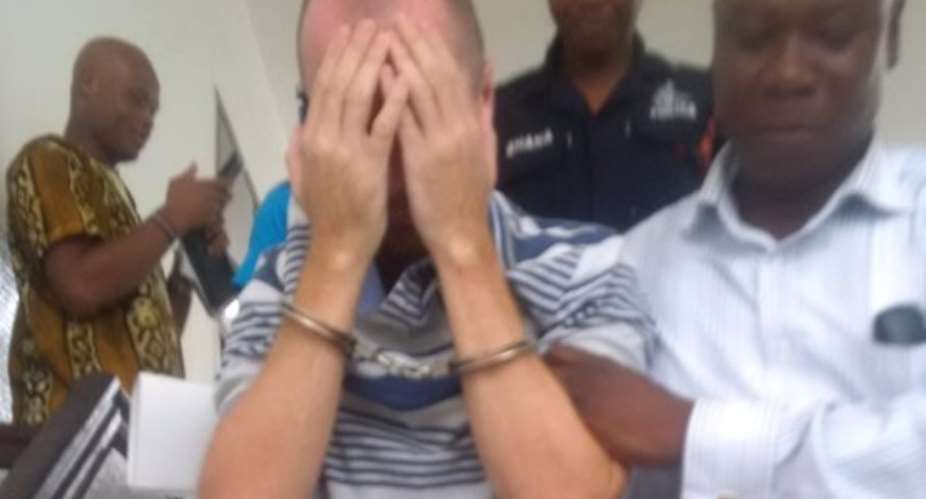The state’s attempt to extradite British fugitive, David McDermott, has suffered a major setback as the process has been put on hold.
This was after lawyers for the suspect challenged the decision of the Court that ordered his extradition to the United Kingdom.
The High Court has subsequently adjourned the case to allow McDermott's lawyers to complete all filing and serving process on the court and the Attorney General.
The Criminal Division of the Accra High Court in April gave the green light to the state to extradite McDermott, for allegedly smuggling 400 kilogrammes of cocaine to the United Kingdom UK. According to the court, presided over by Mrs. Justice Merley Afua Wood, the UK government’s request for McDermott’s extradition was in line with all the necessary legal requirements in the country.
David McDermott is facing three counts: Conspiracy to contravene Section 170 of the Customs and Excise Management Act, 1979, contrary to Section 1(1) of the Criminal Law Act 1977; conspiracy to supply a controlled drug of Class A, contrary to Section 1(1) of the Criminal Law Act 1977, and conspiracy to blackmail, contrary to Section 1(1) of the Criminal Law Act 1977 of the UK.
Although the Court says the offences with which the accused had been charged were not political in nature, McDermott's lawyers think otherwise.
McDermott had been hiding in Ghana from the British authorities under the name David Smith for the past three years but was picked up at his hideout in Accra on March 11, 2016.
He is wanted by the UK government to stand trial in the Liverpool and Knowsley Magistrate’s Court for narcotic offences.
McDermott challenged his extradition and in his defence told the court that there was no legal basis for his extradition.
According to his counsel, Mr Victor K. Adawudu, the extradition treaty between Ghana and the UK had been repealed and narcotic offences were not part of crimes that warranted extradition.
He also told the court that there was no warrant from a magistrate for McDermott’s arrest.
In its ruling, however, the court disagreed with counsel’s argument, stating that although the treaty had been repealed, some of its provisions were maintained and those provisions had kept the treaty in force.
With regard to counsel’s argument that narcotics were not extradition offences, the court, on the contrary, stated that such offences, indeed, warranted extradition because the country was a signatory to the United Nations Convention on Narcotics which enjoined it to cooperate with other countries in narcotic-related offences.
The court, however, agreed with counsel’s argument that the state did not follow due process in arresting the British fugitive because the warrant for his arrest was not signed by a magistrate.
It, however, contended that the violation did not carry any substantial value for a miscarriage of justice.
“Even though due process was not followed, it did not lead to the miscarriage of justice,” it held.
After the ruling, Mr Adawudu prayed the court to allow him to have access to the accused person while he was in custody.
The court granted his prayer and ordered the authorities to allow him to have access to his client.





 Dumsor: Energy sector ‘shepherdless’ – Nana Amoasi VII
Dumsor: Energy sector ‘shepherdless’ – Nana Amoasi VII
 Train accident: Four more grabbed and remanded
Train accident: Four more grabbed and remanded
 Gov't to consolidate cash waterfall revenue collection accounts
Gov't to consolidate cash waterfall revenue collection accounts
 Gov't to settle lump sum for retired teachers by April 27
Gov't to settle lump sum for retired teachers by April 27
 Former PPA CEO granted GH₵4million bail
Former PPA CEO granted GH₵4million bail
 Dumsor: The darkness has exposed you; you’ll go down as the worst in Ghana’s his...
Dumsor: The darkness has exposed you; you’ll go down as the worst in Ghana’s his...
 Dumsor: The ‘incompetent’ person provided a timetable whiles those who came to s...
Dumsor: The ‘incompetent’ person provided a timetable whiles those who came to s...
 Defend, ensure NPP’s good works are ‘sold’ and highlight the ‘bad’ state of the ...
Defend, ensure NPP’s good works are ‘sold’ and highlight the ‘bad’ state of the ...
 Bawumia will rank high ahead of Mahama in any anti-corruption test — Salam Musta...
Bawumia will rank high ahead of Mahama in any anti-corruption test — Salam Musta...
 NPP trying to bribe us but we‘ll not trade our integrity on the altar of corrupt...
NPP trying to bribe us but we‘ll not trade our integrity on the altar of corrupt...
